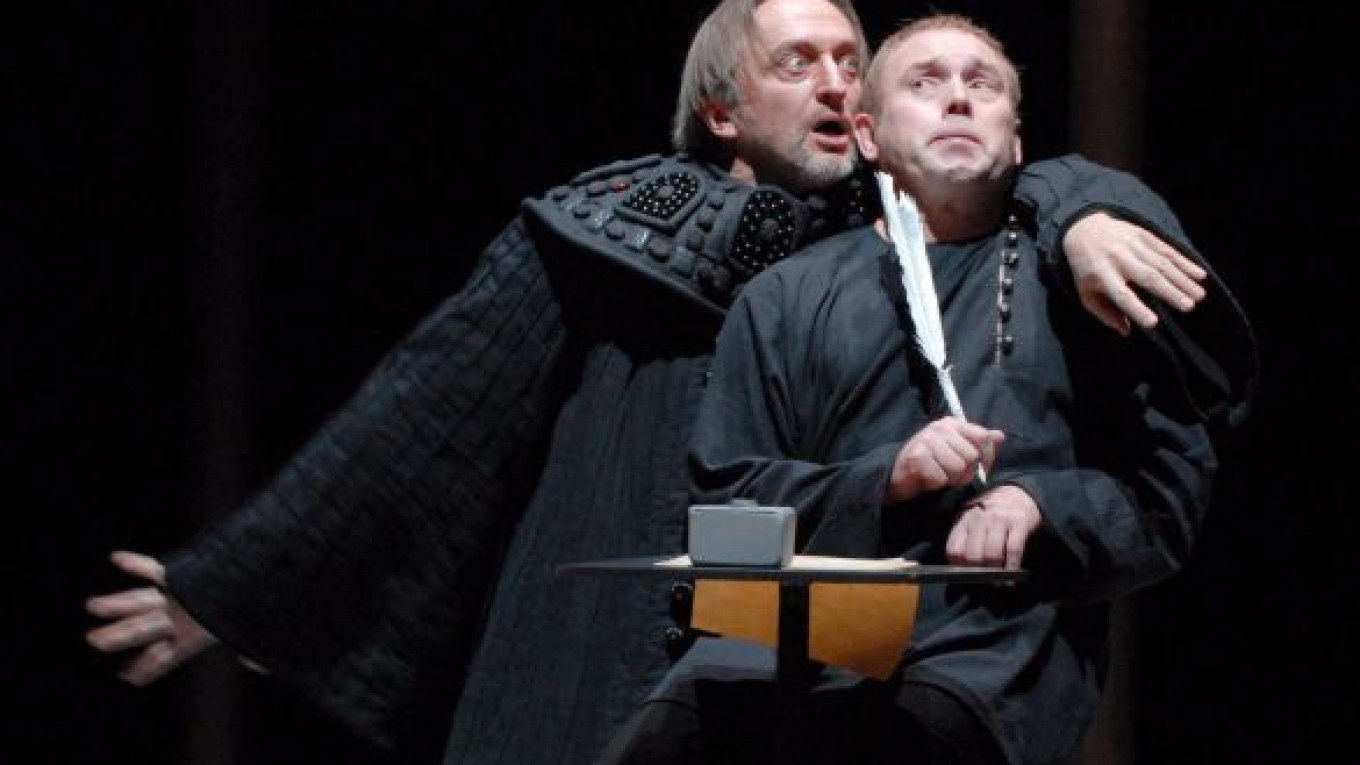Based on portions of a trilogy of 19th-century historical chronicles by A.K. Tolstoy, it literally offers a black-and-white version of the kind of leaders Russia is prone to have. Everyone surrounding Tsar Ioann IV — including the tsar himself, who is better known today as Ivan the Terrible — is dressed by designer Viktoria Sevryukova in black. On the other hand, everyone in the court of Ioann’s son Fyodor is decked out in white.
Obviously, things are more complex in action. And it goes without saying that there is no telling which of the two is worse.
Ioann is the ultimate politician, a shrewd, ruthless man who skillfully pits supporters and opponents against one another to remain in power himself. Fyodor is moved by dreams of fairness and honesty, although there is little proof that this brings anyone any good.
The production rests almost all of its weight on the shoulders of the two principal actors — Alexander Yatsko as the blackly scheming Ioann and Viktor Sukhorukov as the childlike Fyodor.
Yatsko’s powerful performance of Ioann is less an integral portrait of a real human being than it is a collection of possible individual human traits. He can be thoughtful or cruel. He can be haughty or petulant. He is every bit as capable of being terrified as he is of being vicious.
None of these qualities seem to belong to a real person. It is as though Yatsko’s Ioann tries on human feelings as if they were hats — just to see how they fit. The only thing that really appears to be part of his personality is the instinct for coming out ahead in conflicts.
We first encounter Ioann as he timidly declares that he wishes to abdicate the throne. Unable to agree upon a successor, the council of boyars pleads with him to stay on. That, of course, is all Ioann needs to hear. He now holds all power in his hands — power to humiliate and power to kill.
Sukhorukov’s Fyodor is another beast entirely. He would find consensus and persuasion where his father relied upon coercion and force. He believes in the power of fairness, whereas his father simply wielded power.
There is something almost silly in Fyodor’s simplistic idealism. Certainly it makes him weak in the eyes of his court. And the end result is that Fyodor may do his nation more evil because he allows the factions squabbling in the background to bring their battles to the fore.
Sukhorukov creates a tender, vulnerable portrait of a man whose naivete and good intentions might be described as ignorant by someone not encumbered by the need for tact or subtlety. The only person who really appears to value Fyodor’s sensitivity is his wife Irina (Yekaterina Guseva).
In any case Fyodor is no match for Boris Godunov (Valery Yaryomenko), his brother-in-law and close advisor who actually wields the power of the state, and who is locked in a pitched battle for influence with the Shuisky family, led by Ivan (Vyacheslav Butenko) and Vasily (Roman Kirillov).
Ironically, the Shuisky family falls when it, too, suffers pangs of conscience. Apparently this is not a good thing to have in Russia. Ivan Shuisky is ready to rise against the tsar, but cannot do it when he suspects that the simple-minded Fyodor may be a “holy man.”
“Father and Son” works best when sticking to close-ups of the tsars. Their characteristics, their tactics and their flaws all make for compelling theater as performed by Yatsko and Sukhorukov.
Beyond them, not much else keeps this production moving. Most of the opponents, pretenders and schemers come across as small and insignificant, perhaps, in part, because they often stand or sit motionlessly in semicircles and talk.
The stage design, as created by Yeryomin, is simplistic in the extreme. Cosmic, floating images of space occasionally appear on a screen in back while props are kept to a bare minimum — a few black, plyboard throne-like chairs, a cot for the royal bed and an oversized barrel for the royal bathtub. The attempt to be minimalist seems rather to have come out on the shabby side.
But if you close your eyes to that and focus on Yatsko and Sukhorukov, there is plenty to see in this portrayal of Russian power games in action.
“The Kingdom of the Father and the Son” (Tsarstvo Otsa i Syna) plays Sun., March 21 and 26 at 7 p.m. at the Mossoviet Theater, 16 Bolshaya Sadovaya Ulitsa. Metro Mayakovskaya. Tel. 699-2035, www.mossovet.theatre.ru. Running time: 2 hours, 50 minutes.
A Message from The Moscow Times:
Dear readers,
We are facing unprecedented challenges. Russia's Prosecutor General's Office has designated The Moscow Times as an "undesirable" organization, criminalizing our work and putting our staff at risk of prosecution. This follows our earlier unjust labeling as a "foreign agent."
These actions are direct attempts to silence independent journalism in Russia. The authorities claim our work "discredits the decisions of the Russian leadership." We see things differently: we strive to provide accurate, unbiased reporting on Russia.
We, the journalists of The Moscow Times, refuse to be silenced. But to continue our work, we need your help.
Your support, no matter how small, makes a world of difference. If you can, please support us monthly starting from just $2. It's quick to set up, and every contribution makes a significant impact.
By supporting The Moscow Times, you're defending open, independent journalism in the face of repression. Thank you for standing with us.
Remind me later.


